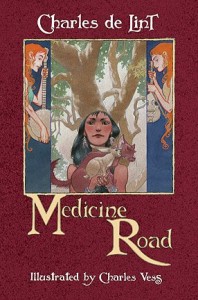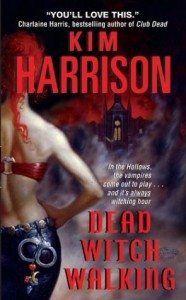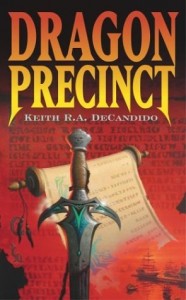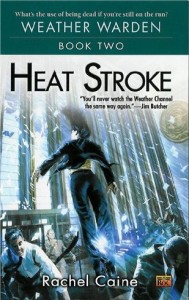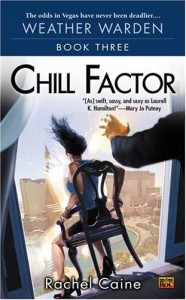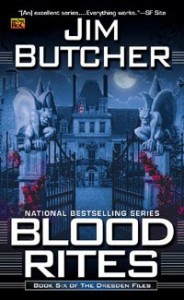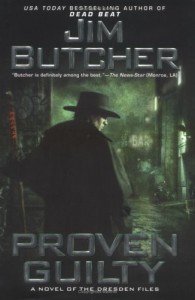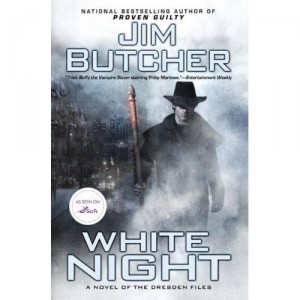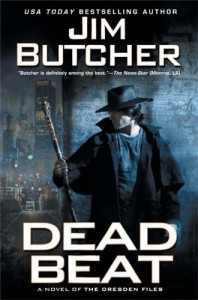 “On the whole, we’re a pretty murderous race.
“On the whole, we’re a pretty murderous race.
According to Genesis, it took as few as four people to make the planet too crowded to stand, and the first murder was a fratricide. Genesis says that in a fit of jealous rage, the very first parent born to mortal parents, Cain, snapped and popped the first metaphorical cap in another human being. The attack was a bloody, brutal, violent, reprehensible killing. Cain’s brother Abel probably never saw it coming.
As I opened the door to my apartment, I was filled with a sense of empathic sympathy and intuitive understanding.
For freaking Cain.”
Jim Butcher — Dead Beat
It has been nearly a year since the last time Harry Dresden’s life was turned inside-out and upside-down by the various supernatural factions that vie for control of the hidden world that exists alongside a more mundane existence. Nearly a year in which he has had time to catch up on sleep, pay the bills, and, oh yes, get used to having his half-brother, the vampire Thomas Rathe, live with him. That’s on top of getting used to finding out he even had a half-brother, much less any living family at all. Harry, the quintessential loner, is finding out just how weird it is to have family and a roommate. On top of that, the Chinese temple dog that followed him home from work last year, Mouse, is now the size of a small pony. As a result, the basement apartment Harry calls home is getting crowded.
Enter Karrin Murphy, Harry’s friend, occasional employer, and just-possibly his romantic interest, if he’d only admit it. And then exit said Karrin Murphy, on her first vacation in years. And then enter the ancient, evil vampire called Mavra, who has every intention of blackmailing Harry into helping her find something called the Word of Kemmler. It seems she has some rather incriminating photos regarding Murphy and her participation in a vampire hunt a while back, the sort of photos you just can’t explain to the public. If Harry refuses, Karrin Murphy will be finished as director of Chicago PD’s Special Investigations, and the good guys will be without a valuable ally.
This being Harry Dresden’s life, he’s immediately plunged into a vicious multi-element struggle that makes the Maltese Falcon affair look like a Bobbsey Twins adventure. The crazies start popping out of the woodwork, everyone looking for either the Word of Kemmlar, or an ancient book about the mythical Erlking, and they either want Harry to find said books, hand them over promptly, or please die now. In some cases, all three. The really bad news? Six of the new nasties in town are necromancers. Before you know it, Harry’s up to his wizard’s staff in zombies, with no end in sight.
And that’s just the beginning. With most of his usual allies either out of town or indisposed, Harry’s got remarkably few resources to draw upon. The most unlikely of these is a polka-loving medical examiner named Butters, dragged into the whole mess simply because he was examining the wrong corpse at the wrong time.
But wait, there’s more. As if someone’s trying to really ruin Harry’s day, word comes that the cold war between the White Council of the wizards, and the Red Court of the vampires, a war for which he was in part responsible for provoking, has just turned hot. Very, very hot. As the effects of the war spill over into Chicago, allies and enemies alike turn up, ready to do battle. And then the true plan of the necromancers, all former disciples of the infamous Kemmlar himself, is revealed. Once again, only Harry has the unique combination of brains, bravado, resourcefulness, and foolhardiness required to stop it. If he fails, the world itself is in for a very bad day. And did we mention that something’s up with Bob, Harry’s talking skull/research assistant/information tool? And of course, there’s a demon trying to corrupt and/or seduce Harry, but what else is new?
Dead Beat is very much a kitchen sink book; Butcher manages to cram in werewolves, wizards, vampires, fairies, demons and zombies, without making it feel crowded. It’s the natural, logical progression of events, built up over the course of the previous six books. Things have been building in the fore- and backgrounds all along, and they continue to do so here, to devastating effect. Butcher may drop characters out of the spotlight, but he never forgets that they’re there, or that they lead lives of their own off screen, as best represented by the maturation and evolution of the Alphas, Harry’s pack of werewolf friends.
I can honestly say that there were times in this book when I was cursing Jim Butcher for the hell he puts his characters through, and the way he’s capable of yanking the rug out from underneath us. No sooner do I start rooting for something, than he switches gears and makes me rue my first impressions. No sooner do I think I know where he’s going, than he upsets expectations. He knows just how to keep his readers on their toes, looking both for missed clues and new revelations.
Harry Dresden is one of the best-realized, most complex protagonists around. The more time we spend in his head, the more we really get to understand what motivates him, and it’s not always pretty. Of course, this means that when things go wrong, as they so often do, we’re right there for a front-seat row. Luckily, it looks as though Dead Beat may be a turning point for Harry with regards to that buried pain and self-hatred that’s so often been the cause of his self-destructive behavior in the past. But only time will tell.
What’s absolutely certain is that Dead Beat is the wildest, strangest, best Dresden adventure to date, an intense adventure that promotes Harry into the front rank of urban fantasy heroes once and for all. The events of this book change the status quo in a fascinating way, setting up the series for some very interesting stories yet to come. After Dead Beat, it’ll be fun to see what Jim has planned next, and how he plans to top this. If you like urban fantasy — if you like Kim Harrison, Charlaine Harris, Rachel Caine, Charles de Lint, Laurell K. Hamilton, Emma Bull, Laura Anne Gilman, or Simon Green — then you need to be reading The Dresden Files. Butcher’s blending of modern fantasy with classic noir sensibilities ensures that there’s never a dull moment in what has fast become one of my favorite series.
Originally posted at SF Site, 2005
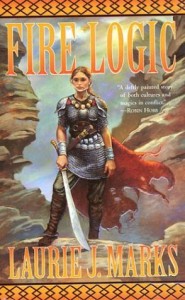 Fifteen years after the fall of the House of Lilterwess, the land of Shaftal is dying, torn apart by a vicious guerilla war between the native Shaftali and the conquering. Without an earth-witch, without the power of the G’deon to rule and heal the land, there seems to be no hope. The former defenders of Shaftal are scattered or slaughtered, waging a desperate war in the hills and forests as their loved ones suffer the repercussions and reprisals. Along the border, the fiercely independent Ashawala’i have been all but exterminated, leaving a single survivor to seek vengeance, and perhaps a death of her own. For too long, the earth has been fed by the blood of the innocents and the guilty alike, but now, several farflung elements have begin to come together, inexorably drawn to one another by destiny and forces beyond their control.
Fifteen years after the fall of the House of Lilterwess, the land of Shaftal is dying, torn apart by a vicious guerilla war between the native Shaftali and the conquering. Without an earth-witch, without the power of the G’deon to rule and heal the land, there seems to be no hope. The former defenders of Shaftal are scattered or slaughtered, waging a desperate war in the hills and forests as their loved ones suffer the repercussions and reprisals. Along the border, the fiercely independent Ashawala’i have been all but exterminated, leaving a single survivor to seek vengeance, and perhaps a death of her own. For too long, the earth has been fed by the blood of the innocents and the guilty alike, but now, several farflung elements have begin to come together, inexorably drawn to one another by destiny and forces beyond their control.
